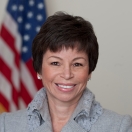
This week I participated in the 55th Session of the United Nations Commission on the Status of Women (CSW) in New York. The Commission was established in 1946 as part of the United Nation’s Economic and Social Council as a mechanism to improve the political, economic, civil, social and educational rights of women. The theme of this year’s session is access and participation of women and girls in education, training, science and technology. To highlight our own work in this area, I joined a panel titled “Changing Mindsets: New Approaches to Advance Women and Girls in Science.” Moderated by Melamine Verveer, the U.S. Ambassador for Global Women’s Issues, the panel discussed our common global commitment to supporting women in science both on an institutional and societal level. I spoke of the President and his entire Administration’s commitment to this issue and outlined specific steps we are taking to achieve this end. My fellow panelists, Minister Iriny Lopes from the Secretariat of Policies for Women in Brazil, Professor Vijayalakshmi Ravindrinat from the Indian Institute of Science, and Business Development Director from Google Megan Smith, discussed their own initiatives that their countries and companies are pursuing and new ways we can inspire girls to participate in the fields of science, technology, engineering, and mathematics (STEM).
Although women represent a majority of college graduates in the United States, they are still dramatically underrepresented in scientific and technological fields. The Commission’s goal was to also discuss this global problem from the beginning: Examining the images young girls see on television, looking at their educational opportunities, and actively expanding programs that get them excited about science. By re-thinking the messages we send to girls regarding science, providing positive role models, and tackling negative societal perceptions of science in the media, we can facilitate their entry in to STEM fields.
Further, we know that sparking interest and promoting education is not enough. Once women enter math and science fields, it is critical to have more flexible workplaces and to ensure that qualified women are able to become leaders, both in their respective fields and as role models to girls.
The discussion at CSW was an important part of an ongoing conversation. President Obama has laid out a bold vision for how we will out-educate, out-innovate and out-build our competitors to Win the Future. We know the educating girls in STEM fields is critical to that vision and we are working to do so.
Valerie Jarrett is the Chair of the White House Council on Women and Girls and Senior Adviser and Assistant to the President for Intergovernmental Affairs and Public Engagement


